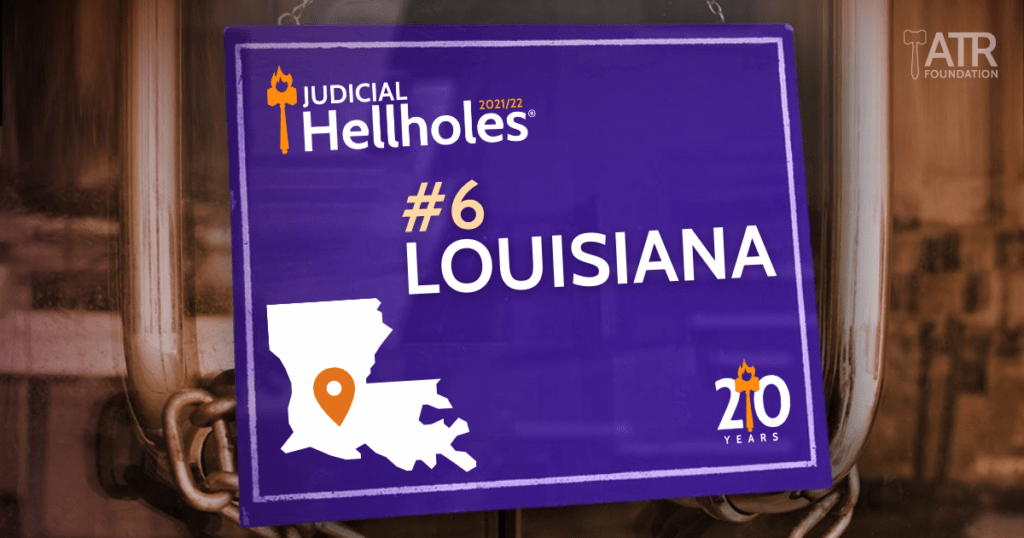‘Highly Unusual’ Rehearing of Louisiana Case Raises Judicial Independence Concerns
Louisiana Supreme Court Waffles Under Political Pressure, ATRA Brief Urges Court to Stand Strong

Coastal lawsuits and Gov. Edwards vetoes contribute to No. 6 ranking
Louisiana is among the worst “Judicial Hellholes®” in the country once again, according to the latest report from the American Tort Reform Foundation (ATRF).
In its 20th anniversary edition of the annual report, ATRF says Louisiana’s never-ending coastal litigation and Governor John Bel Edwards’s (D) penchant for wielding his veto pen to axe civil justice reforms are partially to blame.
Louisiana is ranked the sixth worst Judicial Hellhole® per the 2021-2022 rankings, marking its ninth consecutive year as a Judicial Hellhole®. This summer, the state was named an “Everlasting Judicial Hellhole” due to its persistent presence among the worst tort systems in the nation.
“Louisiana is no stranger to being ranked a Judicial Hellhole,” American Tort Reform Association President Tiger Joyce said. “While the Governor vetoed dozens of bills this year, one would have specifically addressed the scourge of misleading trial lawyer ads that are so rampant in the Pelican State. Coastal lawsuits continued to drag on in the state, as well as concerning acts of misconduct in the judiciary.”
Senate Bill 43, sponsored by Senator Barrow Peacock (R-Shreveport-Bossier), focused on limiting misleading advertising practices and solicitations for legal services. It passed the legislature on a bipartisan vote but was ultimately vetoed by the governor.
ATRF reports that Louisiana accounts for a disproportionate amount of legal services TV ads as well as spending on those ads – 4% of all spending and 5.6% of ads in one quarter – considering that the state makes up less than 1.5% of the nation’s population.
“Widespread trial lawyer advertising signals to businesses that they’re in a Judicial Hellhole, where they’re more likely to get sued,” Joyce said. “These ads drive away businesses who may want to invest in Louisiana as well as push those away who have faced the unfortunate reality of their state’s legal climate.”
Further contributing to Louisiana’s climate of lawsuit abuse as well as high auto insurance costs in the state is a federal investigation into a years-long staged auto accident scheme. Seven more defendants were indicted in September for alleged involvement in schemes seeking to defraud trucking companies and their insurers.
Those accused of staging accidents were compensated for referring the defendants to attorneys who would handle their cases. Subsequently, these defendants received treatment from doctors and other healthcare providers as directed by their lawyers. Through these lawyers, the defendants ultimately secured settlements from insurance companies who provided coverage for the commercial carriers.
“We commend Louisiana law enforcement officials for pursuing the wrongdoers,” Joyce said. “Hopefully, this will deter future individuals from engaging in similar behavior because they know that they will be met with significant civil and criminal penalties if they do.”
Coastal litigation is yet another downside to Louisiana’s civil justice system, ATRF says.
“Coastal lawsuits target Louisiana’s critical energy industry, stretch the law far beyond its intent, ignore critical facts,and involve private lawyers in a space meant for democratically elected decision makers who are accountable to the public,” Joyce said. “Rather than allowing elected officials to create policies that benefit the public, these private lawsuits reinforce the state’s litigious reputation, drive up business costs, and kill jobs for thousands of hard-working Louisianans.”
There have been 43 cases filed by six coastal parishes and the City of New Orleans since 2013, which continue with no resolution in sight. ATRF says the question of jurisdiction remains at issue and that in August, the 5th U.S. Circuit Court of Appeals in New Orleans partially reversed an earlier decision to keep lawsuits filed by Cameron and Plaquemines Parishes in state court. The 5th Circuit remanded the cases back to federal district court to determine if the companies were acting under the authority of a federal wartime agency.
“This decision has implications far beyond these two parishes,” Joyce said. “At issue is whether the hundreds of oil companies named in the suit can be held responsible for allegedly contributing to decades of coastal erosion and wetlands losses.”
A recent study showed that the lawsuits resulted in a loss of more than 2,000 jobs in the state’s oil and gas industry, equating to $70 million per year in lost earnings.
“Even though energy companies provide thousands of quality jobs for hard-working Louisianans and millions in tax dollars for state coffers, these baseless lawsuits continue to move forward under Gov. Edwards and his high-paid trial attorney friends,” Joyce said.
ATRF says Louisiana continues to lose jobs and revenue thanks to high civil courts costs. Residents pay a $451 “tort tax” each year due to the costs of excessive lawsuits.
The current total impact of these costs results in $3.87 billion in lost economic activity and 22,550 jobs lost.
Louisiana is one of eight Judicial Hellholes® in the 2021-2022 report:
Judicial Hellholes® are deemed the most unjust local courts and state civil justice systems in the country. Read the full report at JudicialHellholes.org.
Louisiana Supreme Court Waffles Under Political Pressure, ATRA Brief Urges Court to Stand Strong
Left unchecked, these jurisdictions will continue dragging down economic growth and undermining justice through rampant lawsuit abuse.
Claimants Given Opportunity to Vote on Plan; Judge to Reconsider Scientific Validity of Plaintiffs’ Experts
Legitimate consumer protection demands sound science and impartial analysis — not distorted data designed to manufacture lawsuits.
Law Firms Spent $168M+ on 2.2M Ads in Georgia
ATRA’s Latest Studies Reveal Financial Influence and Lack of Transparency in Pennsylvania’s Campaign Finance Systems